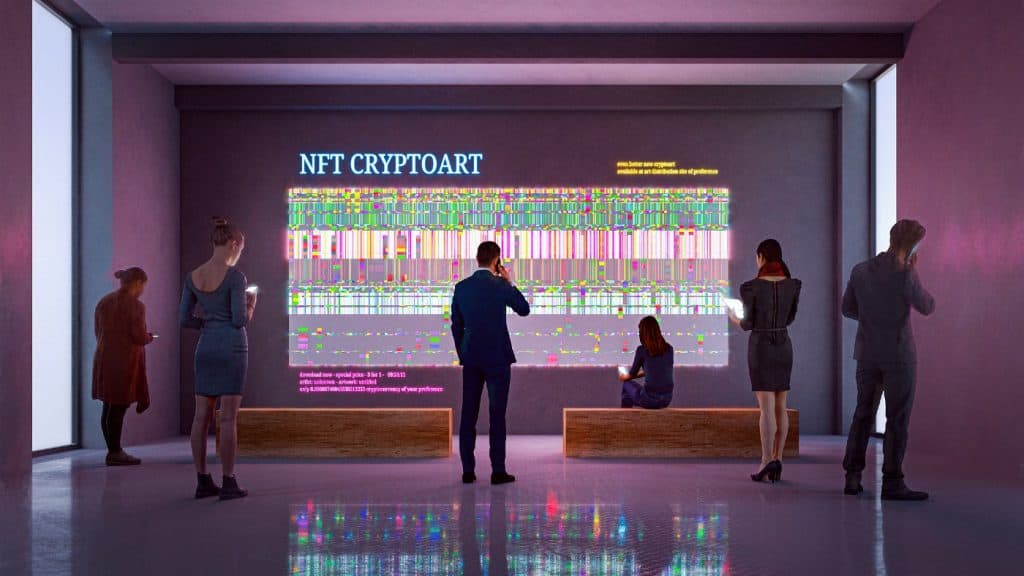Share this page:
NFTs or non-fungible tokens have exploded in popularity this year. So much so that Collins English Dictionary named ‘NFT’ as the 2021 word of the year, putting it alongside previous winners such as ‘lockdown’, ‘fake news’, and ‘Brexit’. It’s in interesting company, I’m sure you’ll agree!
Why has this term become so popular? And why are these digital tokens all the rage right now? Read on to find out the latest scoop from the world of digital assets.
What is an NFT?
An NFT is a one-of-a-kind digital token. This means it represents an individual piece of code stored on a blockchain that cannot be duplicated or replicated.
To explain them in an easy way, I’m going to use an analogy. Picture the blockchain as a wall and an NFT as a digital certificate that represents a small carving in one of the bricks. So, imagine the blockchain is one long piece of wall that’s continuously expanding and these inscriptions are permanent parts of the wall.
The NFT token that proves ownership of the brick with an individual carving can be transferred between people. But all this history of bricks and carvings on the wall (the blockchain) cannot be tampered with or changed.
You’d have to tear down the whole wall (blockchain) in order to wipe away the ownership history and transactions. it’s something that isn’t likely to happen with large cryptocurrency blockchains.
Why has the NFT space become so popular?
These digital tokens have been soaring in popularity over the past year, and Google searches for the term have gone up by 5,425% between January and October!
Adam Morris, NFT expert at community platform NFT Club, explains this boom: “Despite what some people may think, NFTs have mostly been a natural progression. They were present in the 2017 crypto hype, but people were just starting to understand cryptocurrency, so NFTs were too advanced for that time.
“Within this recent crypto rally, there are more people who are experienced in the industry as they went through the 2017 cycle, so as a result, a lot of people who understood the ins and outs of crypto were looking for the next ‘thing’.”
“Currently, the top end of the NFT market is mostly made up of successful business people and people who did very well off cryptocurrency. This is why the price tags on some NFTs are so high, simply because these people have the money to spend.”
What do you need to be wary of when it comes to the NFT space?
Crypto is still a developing industry, and NFTs are a relatively new branch within the space. So you can think of them as a new concept within a slightly less-new concept. For any Christopher Nolan film fans out there, you could call it ‘crypto-ception’ – a dream within a dream.
Adam Morris goes on to explain why you need to tread carefully if you’re thinking about involving yourself with NFTs: “Just like any market, there will be a correction and because NFTs are new, it’s more likely to be a very large correction.
“Similar to how the crypto market was in 2017, people are just discovering NFTs and there is a lot of excitement. At some stage, it will reach a tipping point and most NFTs will drop substantially in value.
“However, NFTs and the technology behind them are definitely here to stay. With the announcement of Facebook rebranding to Meta and the amount of effort they are putting into creating the Metaverse, NFTs have a large role to play in this futuristic setting.”
The content in this article is provided for information purposes only. It is not intended to be, nor does it constitute, any form of investment advice. Bitcoin and other cryptocurrencies are highly speculative and volatile assets. They carry several risks, including the total loss of any monies invested. Readers are responsible for carrying out their own due diligence and for obtaining professional advice before making any investment decisions.
Was this article helpful?
YesNo
About the author
George is a writer and qualified financial adviser focused on educating others in personal finance & investing.
Share this page:
Some offers on The Motley Fool UK site are from our partners — it’s how we make money and keep this site going. But does that impact our ratings? Nope. Our commitment is to you. If a product isn’t any good, our rating will reflect that, or we won’t list it at all. Also, while we aim to feature the best products available, we do not review every product on the market. Learn more here. The statements above are The Motley Fool’s alone and have not been provided or endorsed by bank advertisers. John Mackey, CEO of Whole Foods Market, an Amazon subsidiary, is a member of The Motley Fool’s board of directors. The Motley Fool UK has recommended Barclays, Hargreaves Lansdown, HSBC Holdings, Lloyds Banking Group, Mastercard, and Tesco.
This post was originally published on Motley Fool




